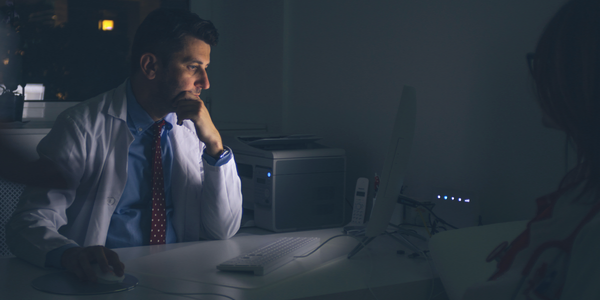
An alarming amount of people truly believe cancer is unavoidable. Many people think cancer is essentially written in their genes and just a matter of time before it strikes.
There are so many cancer myths, that it’s understandably difficult to determine fact versus fiction… But research shows there is some fact to these common myths.
Discover the truth about cancer once and for all!
Cancer Myth #1: Cancer Is Unavoidable or ‘Just Happens’
No one single factor causes cancer. Many factors including genetics, environment, and lifestyle contribute to the onset of cancer. While some of these risk factors are uncontrollable, many preventative measures can reduce the likelihood of developing cancer.
In reality, cancer is a disease caused by the uncontrolled growth of abnormal cells. It develops as the body’s cellular control methods falter.
Instead of old cells dying as they should, they continue dividing and forming “new” cells that can then grow into tumors. However, certain cancers, like those of the blood, don’t involve tumors (3).
Cancer Myth #2: If My Family Member Has Cancer, I Will Get It Too
While genetics definitely play a role in cancer development, it’s not the whole story. It’s true that nearly 90% of cancers have some genetic component, but this still doesn’t mean it’s inevitable for any certain individual. Certain lifestyle habits like diet, exercise, and smoking can greatly increase or decrease the likelihood of actually developing cancer.
Scientists regularly research three types of cancer genes. These include oncogenes, tumor suppressor genes, and mismatch-repair genes:
1. Oncogenes regulate the normal growth of cells and these genes can essentially be switched on or off. A lifestyle habit like consistent exercise may help the switch remain off while excessive alcohol consumption could turn the gene on, which could then lead to disruption of mechanisms that regulate cellular growth.
2. Tumor suppressor genes are actually able to recognize abnormal growth and proliferation of damaged, cancerous cells. When these genes are healthy, they can interrupt reproduction until the defect is mitigated. But if these tumor-suppressing genes are unhealthy, cancerous cells may be free to replicate indefinitely.
3. Finally, mismatch-repair genes recognize DNA replication errors. If the DNA instructions don’t match perfectly, these genes correct the errors. When these genes don’t work properly though, the errors in DNA are transmitted to new cells, causing damage and genetic alterations.
The bottom line is no matter what genes we inherit, our lifestyle choices affect how our genes ultimately behave. Undoubtedly, healthy lifestyle habits tip the scale in favor of genes working correctly.
Cancer Myth #3: Cancer Is Contagious
Generally speaking, cancer isn’t contagious. It can’t spread on surfaces or through bodily fluids or via other ways that typical viruses and bacterial infections can. Even cancers that are tied to certain viruses or bacterial infections can’t be transmitted directly, though, the actual virus or bacteria can certainly spread.
The only way cancer can directly spread from one person to another is through organ transplantation. Even still, the risk of this happening is monumentally low.
It’d be wiser to say that a person who receives a transplant from someone who had a certain type of cancer is at increased risk. It’s certainly not a death sentence but nonetheless, most doctors still avoid the use of organs or tissues from donors with a history of cancer anyways.
Cancer Myth #4: Cancer Feeds Off Sugar
The link between sugar and cancer is complicated and controversial. All cells feed on sugar for fuel. Some scientists suggest that because cancer cells are more active than regular ones, they want sugar that much more.
However, it’s hard to prove this. Plus, many healthful foods - that also have antioxidant properties that could mitigate cancer growth - contain “high” amounts of sugar like fruits, starchy vegetables, and beans and legumes.
Furthermore, while some people may fare well on a high-fat diet during cancer treatment, not everyone does. Some people become more stressed trying to follow an abnormal diet, which is worse for health overall.
Still, it can’t be dismissed that some people who complete extreme water fasts completely eradicate their cancer. This does suggest that the complete cessation of nutrients essentially kills cancer cells. If they can’t feed, they can’t replicate.
Nonetheless, completely refraining from food requires a high level of accuracy, medical supervision, and more and is therefore not carried out in typical medical settings. Under no circumstances should someone with cancer try nutrition interventions alone.
Cancer Myth #5: XYZ CAUSES Cancer
Thanks to Google, well-meaning friends, and the concept of groupthink, many people still believe that single factors or entities CAUSE cancer.
Eat artificial sweeteners? Talk on your cell phone too much? Use the “wrong” beauty products? Those are just a few stereotypes of how to catch cancer.
Just like many other diseases, certain factors may be implicated in the likelihood of developing cancer. For example, smoking highly increases the risk for lung and other cancers. But not everyone who smokes gets cancer, so this relationship isn’t causal.
Other factors that receive causal blame include:
• Artificial sweeteners
• Cell phones and EMFs in general
• Conventional household cleaning and beauty products
• Deodorants and antiperspirants
• Tanning beds
• Burnt foods
• Processed meats and cheeses
• Pollution
• Hair and food dyes
While all of the above are associated with increased risk and some are labeled carcinogens, they don’t directly cause cancer. In fact, other healthy lifestyle habits can counterbalance the negative side effects of the above factors and potentially keep cancer at bay.
Cancer Myth #6: Cancer Treatment Is Predictable
Hearing the word cancer, and many people conjure a certain image of prospective prognosis and treatment. However, cancer treatment is hardly this predictable.
Certain treatments elicit different symptoms and risks and have different likelihoods of getting cancer again. While many people lose weight during treatment due to altered appetites, some people actually gain weight related to less movement. Though, a significant number of cancer patients do experience cachexia, a wasting syndrome marked by significant weight and muscle loss.
Others believe that specific supplements or herbs undoubtedly enhance treatment outcomes, but this isn’t true either. It’s unwise to take any supplemental treatment without speaking to a cancer specialist first.
Still, others believe that cancer patients should exclusively rest while undergoing treatment. But newer research suggests some physical activity improves outcomes and overall quality of life. Whether one feels energized to engage in the activity is very individualized, because again, cancer treatment is unpredictable.
The Bottom Line
Cancer is a non-contagious disease of abnormal cell growth with genetic, environmental, and lifestyle implications. No one thing causes cancer, but certain lifestyle habits - like smoking, poor diet, lack of exercise, and excessive alcohol consumption - increase the risk of cancer by turning cancer-causing or suppressing genes on or off.
Just because a family member or four gets one type of cancer doesn’t mean you’re doomed though. And despite many thinking that sugar makes cancer worse, the correlation isn’t so simple.
Lead a balanced, healthy lifestyle to drastically reduce your risk of developing cancer and worry no more!
References:
Common Cancer Myths and Misconceptions. National Cancer Institute. Updated August 22, 2018. https://www.cancer.gov/about-cancer/causes-prevention/risk/myths.
Eske J. Fasting and Cancer: Benefits and Effects. Medical News Today. MediLexicon International. Written January 14, 2019. https://www.medicalnewstoday.com/articles/324169.
Markman M What Is Cancer?: Forms & Oncology Treatment Options. Cancer Treatment Centers of America. Updated April 13, 2022. https://www.cancercenter.com/what-is-cancer.
What Causes Cancer? Stanford Health Care. https://stanfordhealthcare.org/medical-conditions/cancer/cancer/cancer-causes.html.







